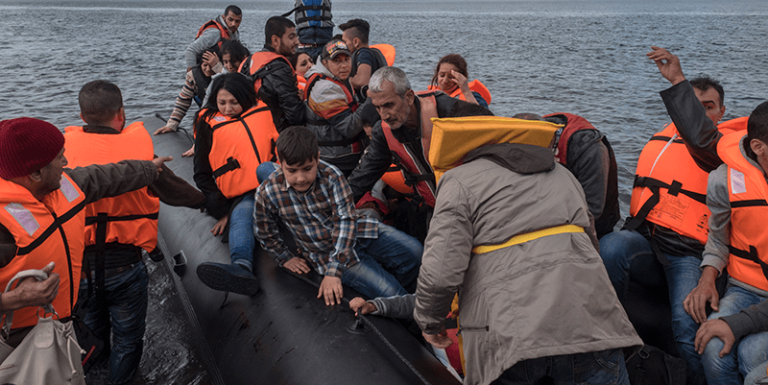
The third annual conference regarding Syria’s refugees was held recently in Brussels where 56 countries were represented at the level of foreign minister. Neither the Syrian regime nor the Syrian opposition were invited to the meeting; however, civil society organizations concerned with the issue of refugees were present, although not in the official proceedings. This conference in Brussels, titled “Supporting the future of Syria and the region,” has become an annual gathering to assert the importance of supporting Syrian refugees. The United Nations High Commission for Refugees (UNHCR) counts some 6.6 million Syrians as internally displaced persons and 5.6 million as refugees in neighboring and other countries, contributing to the highest number refugees in the world since the end of the Second World War.
By holding this gathering, the European Union (EU) intends to keep the issue of the refugees on the international agenda as well as to highlight the burden they represent to receiving countries, especially Lebanon, whose Prime Minister Saad Hariri attended the conference. The EU is also interested in pushing forward the process of political transition under the leadership of the new special envoy to Syria, Geir O. Pedersen, and in accordance with U N Security Council Resolution 2254 that consecrated the 2012 Geneva process.
The conference succeeded in collecting about $7 billion for close to 12 million Syrians made homeless by eight years of war, 70 percent of whom live in extreme poverty. Another important outcome was the insistence of the High Representative of the European Union for Foreign Affairs and Security Policy, Federica Mogherini, that the Syrian war has not yet ended. She asserted that Syria must remain at the top of the world’s priorities and that the EU would not help with Syria’s reconstruction so long as there is no real and credible transition under international guardianship.
Still, the conference exposed some serious divisions among the Europeans who attended regarding the fate of the Syrian regime and President Bashar al-Assad. The official policy of the European Union is to oppose providing reconstruction assistance before the transitional period. However, some countries like Italy and Poland[1] preferred a dialogue with the regime. The European Union was also divided when it previously supported strong measures, led by efforts from Germany, France, and the United Kingdom, against the Assad regime for its use of chemical weapons.
However, there does not appear to have been any political impact from this conference because two important actors in the Syrian case, the United States and Russia, were absent (except for a token American diplomatic presence). The United States has contradictory positions on Syria because of President Donald Trump’s indecisiveness. As for Russia, it still supports the Assad regime and rejects any implementation of the 2012 Geneva process for political transition and writing a constitution; as it stands today, Russia has used the Astana process to kill any discussion of a constitutional document. Further, it is now preparing for the takeover of Idlib province with the Syrian regime, which has already begun shelling the area and causing civilian casualties. Thus, what has become clear is that the Brussels conference has succeeded in reaching an agreement about funding the continuing refugee crisis, instead of resolving its underlying causes.
Indeed, over the years, continuing talks of the Syrian refugee crisis without working to resolve its underlying causes has only resulted in exacerbating it. The reality of the situation is that the refugee crisis is not only detrimental to the host countries, but it is essentially a calamity for Syria itself. The country is deprived of its economic and educational brain trust with the loss of a new generation of young Syrians who would be needed for rebuilding efforts. There are two million school-age Syrians who are internally displaced, with only half of them attending school. There are also 739,000 Syrian children in five surrounding countries who were not attending school as of August 2016.
The Brussels conference did not deal with the reasons that prevent Syrians from returning to their homeland despite the cessation of hostilities in many areas. The World Bank has documented the return of some 103,090 Syrians, but this a paltry percentage of the total. The agency does not follow the repatriated Syrians to know how they are faring; indeed, many have returned only to be arrested by the authorities or to be lost in regime prisons scattered around the country.
International Politics and the Syrian Refugee
The Brussels conference showed a lack of cohesion in the international stance on Syrian refugees. There are also some states that are facing serious pressures from extreme right-wing parties and populists who have outright racist policies especially regarding immigration and refugees, such as in Hungary, Austria, and Italy.
The rise of authoritarian tendencies in Russia seems to be leading the way in similar increases in rightist agitation and xenophobia against the migrant Syrians, who are not seen as victims of a humanitarian situation but as a threat to the host country, its culture, and whiteness. Many communities have come to view the refugees as vanguards of an unwelcome culture or terrorist sleeper cells awaiting the opportunity to commit crimes and attacks against peaceful western countries. This has made the Syrian refugees permanent targets and forced them to return to Syria despite the dangers that befall them there.
A majority of Syrian returnees are from Lebanon, where Hezbollah and certain political factions—such as the Free Patriotic Movement headed by Foreign Minister Gebran Basil—promote a policy of agitating against their presence in the country. Many have opted to return to otherwise unsavory conditions in Syria instead of remaining in Lebanon and being exposed to attacks. In fact, their return contradicted the United Nations’ Pinheiro principles that should govern such a process, including guaranteed rights, international responsibilities, and institutional mechanisms.
The treatment of refugees in Lebanon indicates that they have no international protection from what amounts to national policies dictated by political conditions, such as election cycles. But the reality is that despite all of this, it is unlikely that there will be large numbers of returnees. In addition to personal safety conditions, refugees are faced with the daunting tasks of recovering their property and belongings after years of war, leaving what for some of them has become a good life outside the country and trying to find sustenance in a war-torn Syria.
Russia has so far had very limited success in persuading host countries to help in repatriating large numbers of Syrians. Importantly, Russia is unable to provide monetary inducements to refugees to return. Besides, it is considered to be a friend of the regime and lacks credibility. As for the Europeans, they will continue to link repatriation to political change, as the Brussels conference showed. Finally, the United States appears completely detached from the discussion and unable to influence developments. While Washington continues to call for the political process for transition, it does not have a leading position on implementing such a process or on helping to resolve the refugee crisis. In fact, the Trump Administration’s budget request for fiscal year 2020 eliminates economic and security aid for Syria at the same time as American foreign policy there suffers from disarray and ineffectiveness.

